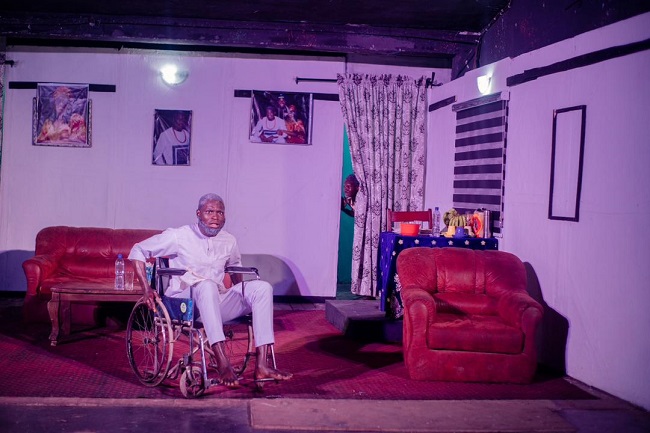It was my first time seeing a play written by Cheta Igbokwe, and so there was not a particular thing I was expecting to see in Brother-Brother. But I went and returned, convinced that there was nothing better I could have done with my time that evening—every minute was worth it. I realized then why a friend of mine never misses any of the playwright’s dramas.
When the first scene opened with the dancing masquerades and moving drumbeats, and when I saw the audience fixated, I knew we were all in for a treat. The play takes us on a ride, smooth at first for the enthusiastic characters, a solemn prayer to an ancestor and witty, life-filled dialogues. There were hearty laughs on occasion. But to our shock, we crashed into a nerve-wracking ending.
After the play, it took some time before my mind unfurled with realizations, and then appreciation for the sheer talent of the playwright. Igbokwe combines the trivial, the serious and the profound in this play that premiered on March 6, 2024, at the New Arts Theatre, University of Nigeria Nsukka, under the direction of Richard Umezinwa. Brother-Brother comes to us in rhythmic music and dance, a most sonorous chorus, characters perfectly suited for their roles, and lighting that gives off a lovely ambience. Through music, action and dialogue, the play explores brotherhood, double-facedness, greed, forgiveness, and the quest for longevity.
What stands out the most for me is the questing of the human spirit for life. Henry Miller says “The frantic desire to live, to live at any cost, is not a result of the life rhythm in us, but of the death rhythm.” Man has not just the desire to live, but a “frantic” measure of it. Man wants to live forever. So says the Holy Scriptures even. So the thought of death and suffering is unwelcome. Okenta goes to extremes in his quest to stay alive. Ifenkili, youthful as a sprout, is an extension of Okenta’s advancing life. Okenta would do anything to keep her alive, including hypnotizing her and locking her up in his house so that “nothing would happen to her.” We learn that Okenta even kills Obelensi, to stamp out any chances that the latter, the maker of the medicine, might destroy it.
On the other hand, Ojemba, Professor of Drama and practical realist, refuses to believe that Okenta was saved from drowning by an invisible being. Ironically, and quite surprisingly, he accepts that his life is tied to Ifenkili’s life, that despite his terminal illness, he would “not be going anytime soon.” He is desperate to stay alive; he does not want to die, just like Okenta. The quest for life is in Ojemba’s willingness to have his accomplishments outlive him, his willingness to have artists paint, sing and write about his “illustrious name.” Isn’t that very much like what we have today—institutions, forums and even sculptures put up in people’s names so that, in them, they would live on? The same quest makes Oriaku greedy for her husband’s money so that she will not just live, but live comfortably.
Also in the role of Oriaku, nicely enacted by Ilogeme Chidinma, we realize the fickleness of human nature. Before Ojemba, she is all nice and sweet, sympathizing with the sick man’s laments. Behind him, however, she is oriaku, desperate to gain all the money she can before her husband’s looming demise. This character got me thinking when she says it is selfishness for her husband to refuse chemotherapy, so she has to be selfish herself. The scene here screams moral greyness. The audience feels both pity for her helplessness and contempt for her greed. It calls to mind the words of T.F. Hodge who says, “It’s futile to point the finger of condemnation and say, ‘Men… this’ or ‘Women… that.’ Truth is, we are all guilty and innocent of many of life’s trials.”
The relationship between the brothers here goes from one tainted with resentment to one clothed in love and familial loyalty. Okenta goes from the brother who once prayed to his ancestors for the death of his older brother, Ojemba, to the one who wants this brother to live as long as possible. It is the will to live long that unites the brothers. It leaves the audience with a warm feeling, the shared laughter between the duo, the witty use of proverbs. This makes it even more difficult, more heartbreaking for the audience to come to terms with the ending of the play.
Nwajei Kelechi plays his role the best in this premiere. Embodying the character of Ojemba, he portrays perfectly the returned and ailing fugitive in Ojemba’s coughs, his plain and forthright demeanour, American-accented English and the Igbo names that drip off his lips like gum. The audience is awed by this performance. At some point, I had no doubt he must have spent some time abroad to speak the way he did. This attests to the power of performance, of one getting out and far from himself to become a different person. We are also moved to pity by the wheelchair, and the frantic, painful coughs. The character of Okenta makes the audience laugh the most. Nwachukwu Sopulu bearing this role brings to us raw and original character whom many in the audience can relate. We all know that one person who says one thing here and a different thing there. His laments before his brother over the latter’s illness and impending death have a histrionic tinge to it. That is the part that moves the audience to laughter the most.
The lighting, setting and stage design are apt, many thanks to stage managers Blessing Chinenye Odoh and Ugwumba Mary-Pamela. The sepia-toned light coming on in the sparsely furnished bedroom of Okenta and Ifenkili easily tells that it is midnight and that this couple is not very well-to-do. It contrasts with the bright lighting and cosy furnishing of Ojemba’s sitting room, the dining table with fruits on it, the family photos on the wall and the floor rug. A staged play would always beat one that is only written for many reasons, one of them being that in a stage play, you hear the chorus and enjoy the songs. The chorus was magic on its own, sixteen sonorous voices seamlessly uniting to spray the audience with goosebumps. All combined makes Brother-Brother a memorable play.
Igbokwe is indeed the playwright who, through his art, pokes the nature of humanness and its many facets. We realize that man strives to live life as well as he can. It is in this striving that he learns humanity because he strives alongside others; he learns empathy and forgiveness. We realize also that this striving may morph quickly into over-ambitiousness.
Brother-Brother lets us see how over-ambitiousness manifests in a quest to “live at any cost.” Still, the question remains, ‘Is it better to live life as it comes to us or to take our chances and lunge after it?’
Find Brother-Brother on YouTube via https://youtu.be/w1QRvaneDZo?si=RcRIB12lvnNrIb3h
Chinweizu Ugwuagbo is a writer and graduate of the English and Literary Studies department, UNN.
WATCH TOP VIDEOS FROM NIGERIAN TRIBUNE TV
- Let’s Talk About SELF-AWARENESS
- Is Your Confidence Mistaken for Pride? Let’s talk about it
- Is Etiquette About Perfection…Or Just Not Being Rude?
- Top Psychologist Reveal 3 Signs You’re Struggling With Imposter Syndrome
- Do You Pick Up Work-Related Calls at Midnight or Never? Let’s Talk About Boundaries





